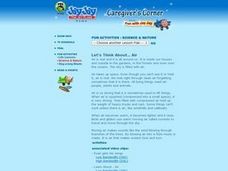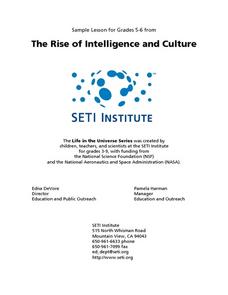Curated OER
The effects of microgravity
Fourth graders are given a scenario in the lesson that presents a problem that needs to be solved. They conduct research from multiple sources in order to gather information. This is used to contribute to possible solutions proposed by...
Curated OER
But I Need This
Third graders place everything in their desk or back pack onto their desk top. They explain why each item is needed. They receive a set of pictures and write a list of things each person or animal needs to survive. They compare people,...
Curated OER
Soybeans in Space
Students work together to design an experiment that compares and contrasts differnet plant cultivation systems. In groups, they evaluate the results of the experiment to discover if the cultivation system could be used in space. They...
Curated OER
Nutrition in Space
Students discover the importance of a healthy diet during space travel and examine the physiological changes astronauts experience while in space. In groups, they develop questions to determine an astronaut's food intake and identify...
Curated OER
Got Space?
Students explore our solar system of planets through research and activities. Using cooperative grouping and interaction, students gain an understanding of how the characteristics of the planets differ from one another.
Curated OER
Winer Survival
Students study how animals need water, food, shelter, and space to survive. They also study what animals need to survive in the winter. They play the part of animals and winter "threats" in a game of tag to reinforce concepts.
Curated OER
Origins: Earth is Born
Students collect and identify micrometeorites from space. Students create collection devices and retrieval methods for matter. They prepare slides and view particles found. Students discuss where the identifiable particles originated...
Curated OER
Out of This World and Into Our Classroom
Students complete a background survey on technology to determine where they need to focus on to complete this project. Using the Internet, they research a topic in Astronomy they are interested in and determine what math concepts are...
Curated OER
Let's Build a City In the Solar System
Sixth graders explore the solar system. Using the Internet, 6th graders gather information about planets in our solar system. Students participate in an activity to determine where they should build the first city in space. They create a...
Curated OER
Colonizing the Stars
Young scholars compare and contrast the size, composition and surface features of the nine planets of our solar system with the possible sizes and compositions of extra -solar planets.
Curated OER
A Leap of Space
Students explore how smaller systems exist within larger systems as they build a collage of their place in space! Invite the students to display their posters and talk about their systems and systems of systems.
Curated OER
What's Left to Explore-Space and the Ocean Floor
Students describe unique exploration studies of the ocean floor and space. They utilize research skills and write summaries of research studies using the Internet. Students answer a variety of questions over their research findings.
Curated OER
Sunspots: Correlating Sunspots to Active Regions
Students investigate sunspots. They use solar imaging from satellite instruments which are currently circling the sun. Students compare images from the satellites and determine the existence of a correlation between the two types of...
Curated OER
Air: You Can't See It, But It's There!
First graders investigate that air occupies space by performing experiments that show this principle. Students are provided with a lunch bag. Students open the lunch bag and look inside. Students determine if there is anything in their...
Curated OER
Is it Really Winter in Australia? It is June!
The purpose of this activity is to determine how the location of a place on the Earth (hemisphere) determines what season that place is experiencing relative to the Sun's rays. Day one the students will be introduced to the terms...
Curated OER
TE Activity: Nidy-Gridy
Students make a grid and coordinate system map of their classroom as they investigate why it is important to have a common map making system. They look at how landmarks are used for navigating an area.
Curated OER
Pack Your Bags for a Trip to Another Planet
Student investigate and understand the planets and their characteristics and create a hypothetical travel brochure through the solar system.
Curated OER
My Spacecraft to Saturn
Learners discover problems that NASA must deal with on a daily basis. They work together to think of solutions and sketch their own idea of a spacecraft. They discover the concept of engineering.
Curated OER
My Spacecraft and Cassini
Students discover solutions to the problems that NASA used in a previous lesson. They write a paper comparing and contrasting their spacecraft idea to the one that was actually used to go to Saturn. They also discover Saturn's moons.
Curated OER
Space Presents Problems
Middle schoolers use the internet to research problems related to space. They complete a questionaire to direct their research before beginning. They create a database of moon and planet characteristics.
Curated OER
Let's Think About Air
Students explore the concept that air is all around us and identify ways that we can use air, and what air can do. They watch a short video that illustrates some of their findings.
Curated OER
Where Next?
Young scholars read an article explaining NASA's possible Mars landing sites. They use the Internet to research Mars and the Module. They are able to submit their own proposals for a landing site after researching the planet.
Curated OER
Planetary Tourism
Students pretend they are the first student to be allowed in space. They examine all nine planets on their journey. They complete a KWL chart and worksheets before they do their research. They create an itinerary of their tour and...
Curated OER
Extraterrestrial Communication: Can We Talk to Anybody Out There?
Learners examine the possibilities of communication with other living organisms within our solar system through research and hands on activities, as well as observing and analyzing teacher demonstrations.

























